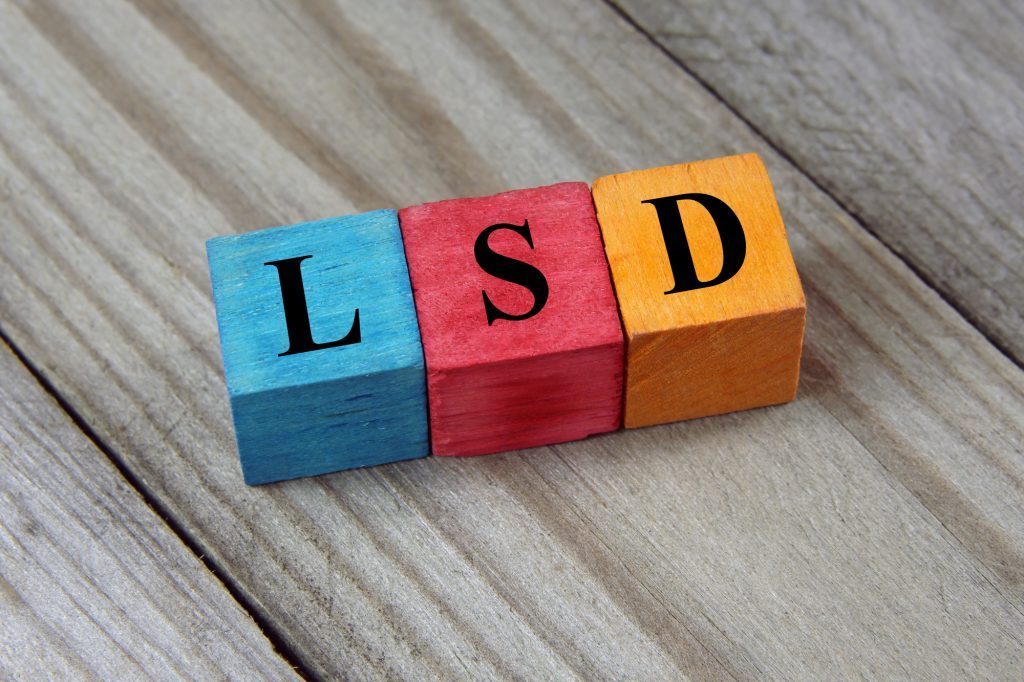Acid; Lysergic Acid Diethylamide
Thousands of people worldwide find themselves taking LSD. It’s become a problem whether they are taking it for religious or recreational purposes. For users, it’s all about experiencing a trip that you wouldn’t experience when sober.
In this guide, we’re going to take you on a journey beginning with the history of LSD, the long term effects of LSD, and more. By the time we’ve finished detailing everything for you, you’re going to know more about the hallucinogen than you ever thought you would.
It’s essential to know these things because if you are struggling with drug use, educating yourself is the first step in getting them the help they need. Let’s not miss another beat; get ready because the ride is about to begin.
What Is Acid?
Lysergic Acid Diethylamide, otherwise known as acid or LSD, is a hallucinogen. In most places across the world, this drug is illegal and rightfully so. Constant and prolonged use of the drug can cause adverse side effects for those that are taking it.
Although the effects of the LSD drug aren’t said to be addictive there, it has been noted that the user’s tolerance for the drug may increase depending on how much they are using. This means that to continue feeling the same experience that they felt the first time, they will need to take more and more as time goes on.
When a person isn’t using the drug, they will find that not only do they feel sluggish, but they also will feel like they lack the energy and motivation to do anything that they might have once wanted to do. These feelings can leave them irritable and ready to find their next fix to achieve the high that they’re now missing.
Statistically, 10% of people have admitted that they’ve used LSD at least once in their lifetime. Unfortunately, one time is too many, and there is no guarantee that the one time use won’t lead to life-altering effects when taking LSD.
Now that you’ve got some background information on what LSD is, we think it’s time to discuss how long it can remain in the system of those using it. When you check out this next section, you may be quite surprised at what you find out.

How Long Does LSD Stay in Your System?
If you’re on the hunt for a job or want to know for educational purposes, you might be interested in how long LSD stays in your system and the different ways that it can be dedicated. The effects of LSD can last upwards of 12 hours.
LSD effects may begin anywhere from a half-hour to a full hour after the user has ingested the drug. Now that you’ve got that understanding, here are the timetables for how long after the LSD experience ends that the drug still is detected in one’s system.
If your urine is tested, LSD can still be found in it for upwards of 4 days. A urine test is the most common type of drug testing that most businesses perform; it can keep you from getting a job.
Because managers want to know that the people they’re hiring to work in their offices are reliable and will get their work done, they don’t want to worry about you hurting yourself or others in the same working area that you’re in.
The next and more expensive way to test for LSD in the body is through a blood test. A blood test can only detect prior LSD use within 12 hours of the last time you used the drug.
And as far as a hair follicle test goes, this is the test that can detect LSD use over a more extended period. If you’ve used it within the last 90 days and are having a hair follicle test done, the drug will be detected in your system.
What Happens When You Mix Acid and Alcohol?
Often, when people are using, it’s not uncommon for them to mix one substance with another. At this moment, we’re going to take into account what can happen when a person combines alcohol with acid at the same time.
Alcohol acts as a suppressant, and the more that someone drinks, the more their inhibitions are lowered. Over time as they continue to consume alcohol, it will be much more challenging to control their movements, and their speech may become more slurred.
Acid doesn’t act as a suppressant; in fact, it can be seen as a stimulant that creates this realm of hallucinations. The issue is that no one can be certain how their bodies will react when taking LSD.
Will they have a bad trip? Will the experience increase the paranoia that they already feel? Most people using acid may find that they use alcohol to help control the effects that LSD has on their bodies.
Although the point of drinking alcohol while using may be to lessen the long term effects of LSD, there are times when alcohol can enhance the effects of LSD. And in those cases, things can take a wrong turn quickly.
Here are some of the short term effects that take place when people are using LSD.
Intense Mood Changes
Most people that have admitted to using LSD find that one of the most common short-term side effects they experience is an enhanced mood. While most experience an overwhelming joy while using, there are some times where this mood can take a turn for the worst.
If the visuals that someone is experiencing are horrific and terrifying, it can cause them to act out in a threatening manner. The issue with someone acting out fearfully is they’ve forgotten that what they’re experiencing isn’t real.
When people aren’t able to distinguish between reality and fantasy, not only can it lead them to harm themselves, but it can also lead to others being harmed in the process without their knowledge.
Strange Thoughts
Again because your reality is distorted, it can lead you to have strange thoughts. Some people have reported that the use of LSD can leave them feeling intense paranoia.
This type of paranoia can lead them to become untrusting to those that are around them or lead them to make dangerous decisions. For example, if someone thinks that people are out to get them, they may begin to barricade themselves in their home and refuse to interact with others.
While isolation may not seem strange to others, especially during COVID-19, the issue arises when someone is using while they’re in isolation. Their loved ones may become worried that they’re not taking care of themselves or become scared that they may overdose while being in isolation.
In some places, when things like this occur, the family may ask for a wellness check to be performed to determine whether their loved one will need the attention of outside medical help.
The increase in strange thoughts may be cause enough for medical professionals to admit them to a hospital until they’ve reached a place where they’re more stable and able to take care of themselves.
Auditory and Visual Hallucinations
This is one of the most common short term and long term effects of LSD that people speak about. People speak about having this intense visual hallucination where they see things that appear to be real, but in actuality, aren’t real at all.
While these hallucinations are pleasant and vibrant in colour for most people, they can also be scary if someone has a bad trip. People also report hearing things that aren’t there.
The things that they hear can be voices calling their names, or they can be sounds that they’ve never heard before. The issue with hearing sounds that you can’t see or find is that they can increase paranoia.
Some people who have given up using LSD may realize that they continue to hear and see things that aren’t there. Why is this, you may be wondering? Their brains have remained in a heightened sense of stimulation that they haven’t returned to normal when they stop using.
In some cases, it can take a very long time for their brains to recover from the length of time that they spent using and in other cases, even when given time, the brain will never return to the state it was in before using.
Time Change
When taking LSD, a person may feel that they were on the trip for anywhere from a couple of minutes to a few hours. This is what we call a distortion of time that the user is experiencing.
A distortion of time can be a crucial sign that someone has begun to abuse LSD. For example, if they’re taking the drug before going to work and completely forget that they are supposed to work within the hour.
Or if the user has agreed to a prior event but instead use and lose track of time, this is another sign that someone is abusing LSD. Those are some of the short term effects of using LSD, and now we’re going to get into the long term effects that can arise from using LSD.
Psychosis

One of the first long term effects that take place when someone has been abusing LSD is psychosis. Psychosis is when the brain breaks from reality and has difficulty distinguishing between real and not real. This can also occur with legal highs.
Even after someone has chosen to become sober, they may continue to suffer from this psychotic break. Drug-induced psychosis can take time to heal from, but for the most severe cases, they may never heal from their psychosis.
Psychosis can cause other mental health issues to arise that weren’t there before a person began using drugs.
Random Dissociative Mindsets
Another side effect of long term use is periods of a dissociative state of mind. This is when the user randomly finds themselves not understanding where they are, what they’re saying, or doing.
This is a sign that the brain hasn’t yet fully healed from the past drug use and is still struggling to return to a state of homeostasis. Many studies have been conducted to show how the protein in the brain can be affected as a result of use.
Along with these dissociative times, a person may also find themselves plagued with flashbacks. These flashbacks may be seeing or hearing things that they’ve experienced in past experiences.
Or it could be things that they’ve never seen or heard at any point in time when they were using. The problem with this is that these flashbacks can take place at any given point, which can be dangerous to those experiencing them and the people around them. This sort of flashback is often connected with re-experiencing the effects of a hallucinogenic drug, such as LSD or magic mushrooms.
Long Term Effects of LSD: Healing After Tripping Down the Wrong Path
The long term effects of LSD can differ depending on the person that has been using the drug. In general, people may find themselves having periods of time where they are dissociated from the world around them.
Or they may find themselves having flashbacks to trips that they’ve taken before. If you or someone you love has been struggling with an LSD addiction, you must do what it takes to get help. Contacting The Rehab Guide is the first step in getting the help that you need.
There’s no limit to what you can do and the life you can have when you’re sober with various programs and resources.

John has dedicated his life to finding treatment for those with addictions and supporting their families.
A business manager for 20 years in the construction industry John’s own experience of addiction led him to found his own rehab centre group in Scotland.
John qualified as a counsellor for people with substance misuse during his time working as a therapist and manager for the foundation. He also trained as an interventionist and appeared on ITV as a consultant helping families impacted by addiction.
He has helped thousands of people in recovery and his knowledge of the rehabilitations process and the addiction experience is unparalleled.


